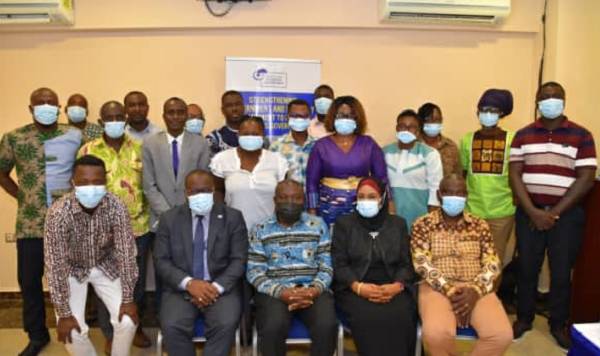Help prevent human rights violations in fisheries sector - Ghanaian media urged.
Ghanaian media has been challenged to increase its reportage on the trawl sector in order to help reduce reported incidence of abuse, violence and inhuman treatment of Ghanaian crew members on such vessels in the country.
This was part of recommendations made in a new study conducted on the Ghanaian trawl sector by Dr Vanessa Jaiteh of the University of Nottingham Rights Lab in UK.
The study which looked at the working conditions of Ghanaian crew members on fishing vessels mostly controlled and co-owned by foreigners indicated that many Ghanaian nationals were ill-treated on such vessels, with many dying in the process.
Presenting the findings of the study at a media training workshop in Accra via Zoom on Wednesday, June 22, 2022, Dr Jaiteh called for increased transparency on beneficial ownership of vessels, vessel inspection protocols and standards, recruitment processes and fines and sanctions imposed for labour rights violations.
She said there was the need to tighten controls around foreign involvement in the trawl sector to protect industrial fishers and observers, protect artisanal livelihoods and to support the recovery of fish stocks.
The University of Nottingham Rights Lab researcher further called on state actors to strengthen capacity to protect fish workers by enforcing already existing laws and treaties such as the Port State Measures Agreement (PSMA).
For Dr Jaiteh, enhancing effectiveness of interagency cooperation as well as addressing systemic exploitation of fish workers on vessels would help to protect the rights of Ghanaian crew members on fishing vessels.
She said her study discovered that many of the Ghanaian crew members live in unsanitary conditions on the vessels whilst the operators of the vessels looked on.
“Forty-five per cent of industrial fishers mentioned the need for unions to represent their interests and defend their rights,” she noted, saying “the media can help bring awareness of the human cost of seafood production to consumers, who hold great power for change.”
On his part, the Deputy Minister of Fisheries and Aquaculture Development, Mr Moses Anim, encouraged the Ghanaian media to be more interested in the fisheries sector since their role could help to manage the sector sustainably.
He said the media had a critical role in helping the Ministry and other regulatory bodies as well as the players in the sector to conform to good fisheries governance and management practices.
He said the fisheries sector had been underreported for many years and needed to be highlighted by the media due to its complexities in job creation, food security and poverty eradication.
The Executive Director of Journalists for Responsible Fisheries and Environment, Mr Kingsley Nana Buadu, pledged the commitment of Ghanaian journalists particularly those reporting on the fisheries sector of sustaining their efforts to bring down all IUU fishing practices in the country.
He said Ghanaian journalists would continue to prioritise the interests of Ghanaian nationals in the fisheries sector, including those on board fishing vessels so as to ensure their safety and wellbeing.
He expressed the concern that it was heartbreaking that Ghanaian nationals onboard fishing vessels were ill-treated by the owners of such vessels without recourse to any human rights.
Mr Buadu also encouraged the Fisheries Commission and the Fisheries Ministry to severely punish owners of fishing vessels whose operators abuse the rights and dignity of their Ghanaian crew members.
He said Ghanaian nationals should no longer suffer abuses and violations of their human rights in their own country by foreign nationals who are working in the country.



No comments yet
Be the first to share your thoughts!